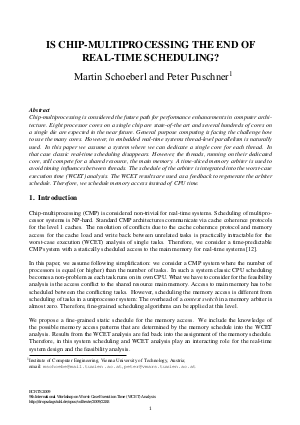Is Chip-Multiprocessing the End of Real-Time Scheduling?
Authors Martin Schoeberl, Peter Puschner
-
Part of:
Volume:
9th International Workshop on Worst-Case Execution Time Analysis (WCET'09) (WCET 2009)
Part of: Series: Open Access Series in Informatics (OASIcs)
Part of: Conference: Workshop on Worst-Case Execution Time Analysis (WCET) - License:
 Creative Commons Attribution-NonCommercial-NoDerivs 3.0 Unported license
Creative Commons Attribution-NonCommercial-NoDerivs 3.0 Unported license
- Publication Date: 2009-11-26
File

PDF
OASIcs.WCET.2009.2288.pdf
- Filesize: 139 kB
- 11 pages
Document Identifiers
Subject Classification
Keywords
- WCET analysis
- multicore
- chip multiprocessing
- memory access scheduling
Metrics
- Access Statistics
-
Total Accesses (updated on a weekly basis)
0Document
0Metadata
Abstract
Chip-multiprocessing is considered the future path for performance enhancements in computer architecture. Eight processor cores on a single chip are state-of-the art and several hundreds of cores on a single die are expected in the near future. General purpose computing is facing the challenge how to use the many cores. However, in embedded real-time systems thread-level parallelism is naturally used. In this paper we assume a system where we can dedicate a single core for each thread. In that case classic real-time scheduling disappears. However, the threads, running on their dedicated core, still compete for a shared resource, the main memory. A time-sliced memory arbiter is used to avoid timing influences between threads. The schedule of the arbiter is integrated into the worst-case execution time (WCET) analysis. The WCET results are used as a feedback to regenerate the arbiter schedule. Therefore, we schedule memory access instead of CPU time.
Cite As Get BibTex
Martin Schoeberl and Peter Puschner. Is Chip-Multiprocessing the End of Real-Time Scheduling?. In 9th International Workshop on Worst-Case Execution Time Analysis (WCET'09). Open Access Series in Informatics (OASIcs), Volume 10, pp. 1-11, Schloss Dagstuhl – Leibniz-Zentrum für Informatik (2009)
https://doi.org/10.4230/OASIcs.WCET.2009.2288
BibTex
@InProceedings{schoeberl_et_al:OASIcs.WCET.2009.2288,
author = {Schoeberl, Martin and Puschner, Peter},
title = {{Is Chip-Multiprocessing the End of Real-Time Scheduling?}},
booktitle = {9th International Workshop on Worst-Case Execution Time Analysis (WCET'09)},
pages = {1--11},
series = {Open Access Series in Informatics (OASIcs)},
ISBN = {978-3-939897-14-9},
ISSN = {2190-6807},
year = {2009},
volume = {10},
editor = {Holsti, Niklas},
publisher = {Schloss Dagstuhl -- Leibniz-Zentrum f{\"u}r Informatik},
address = {Dagstuhl, Germany},
URL = {https://drops.dagstuhl.de/entities/document/10.4230/OASIcs.WCET.2009.2288},
URN = {urn:nbn:de:0030-drops-22885},
doi = {10.4230/OASIcs.WCET.2009.2288},
annote = {Keywords: WCET analysis, multicore, chip multiprocessing, memory access scheduling}
}
